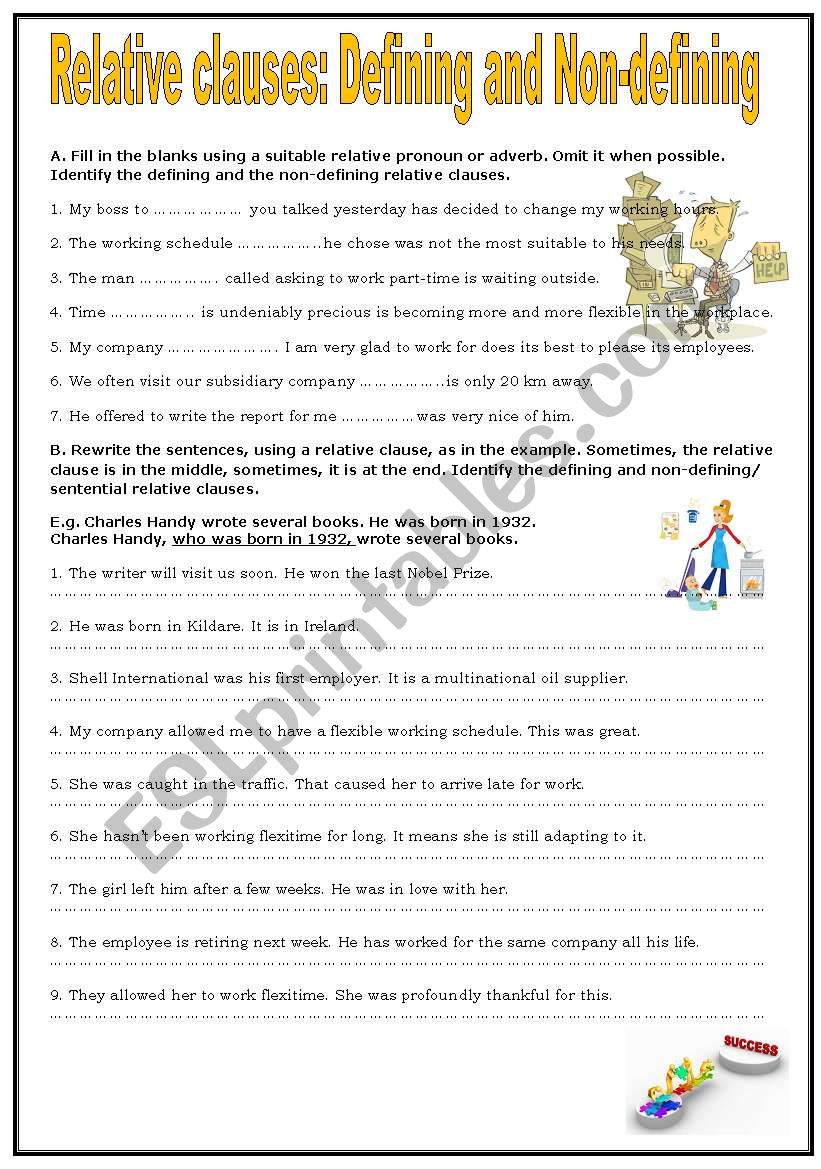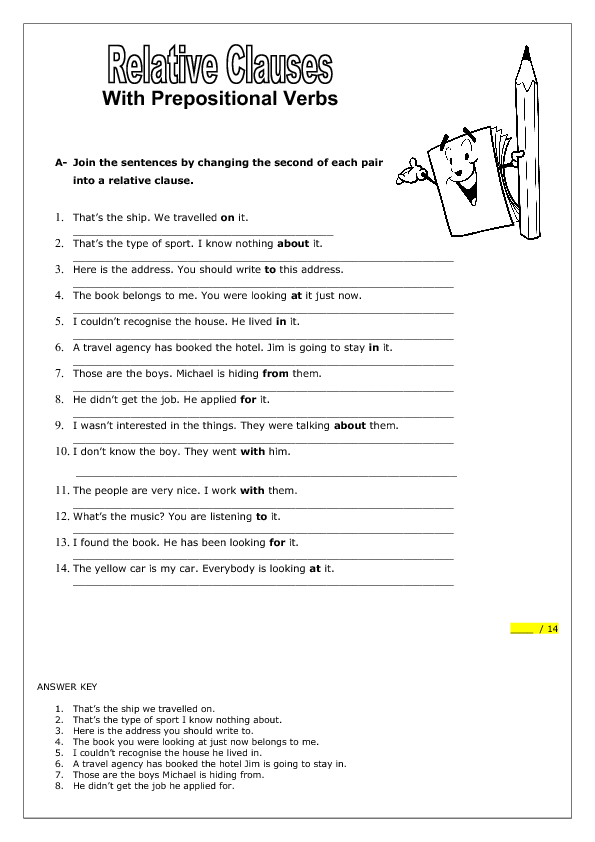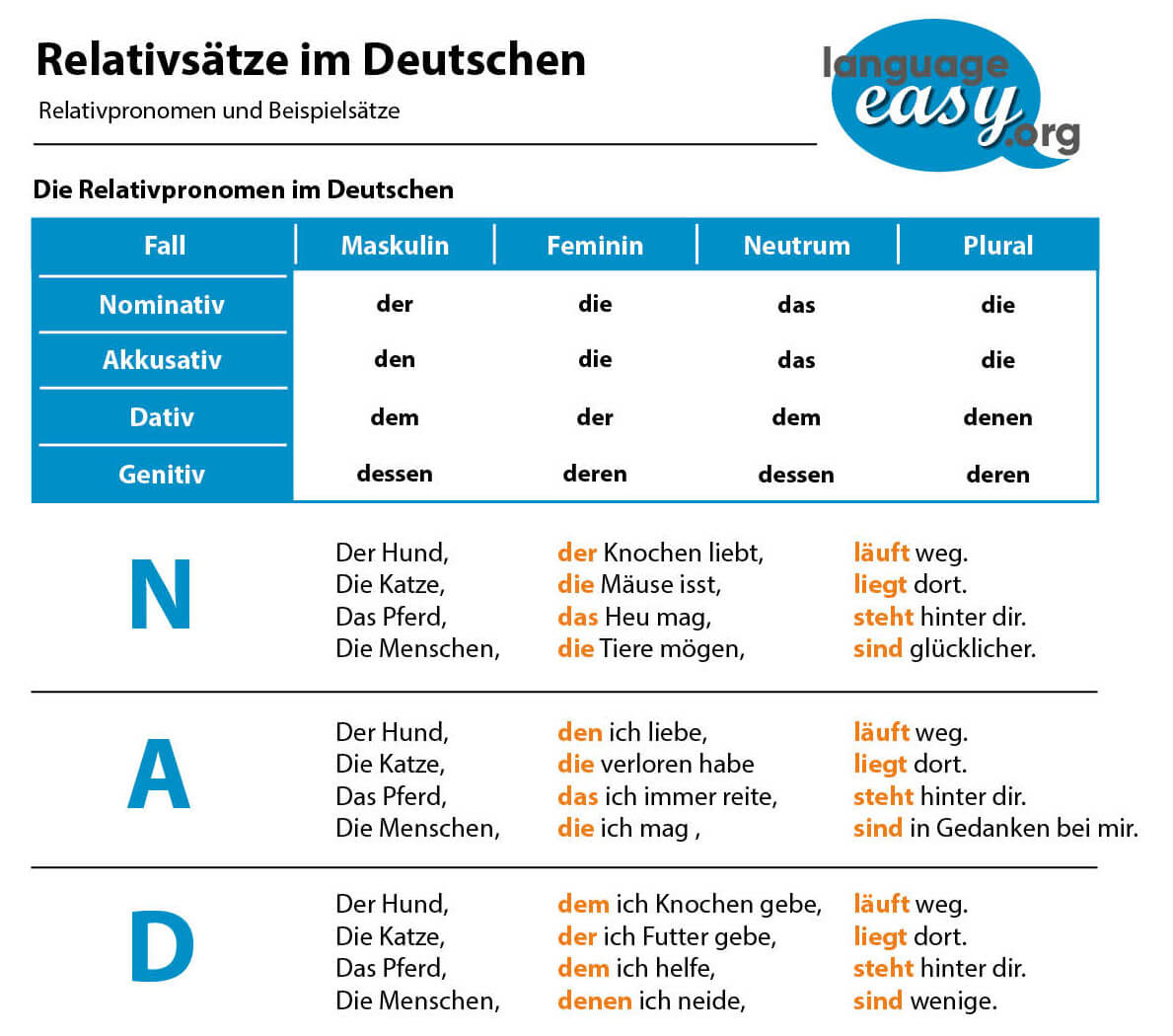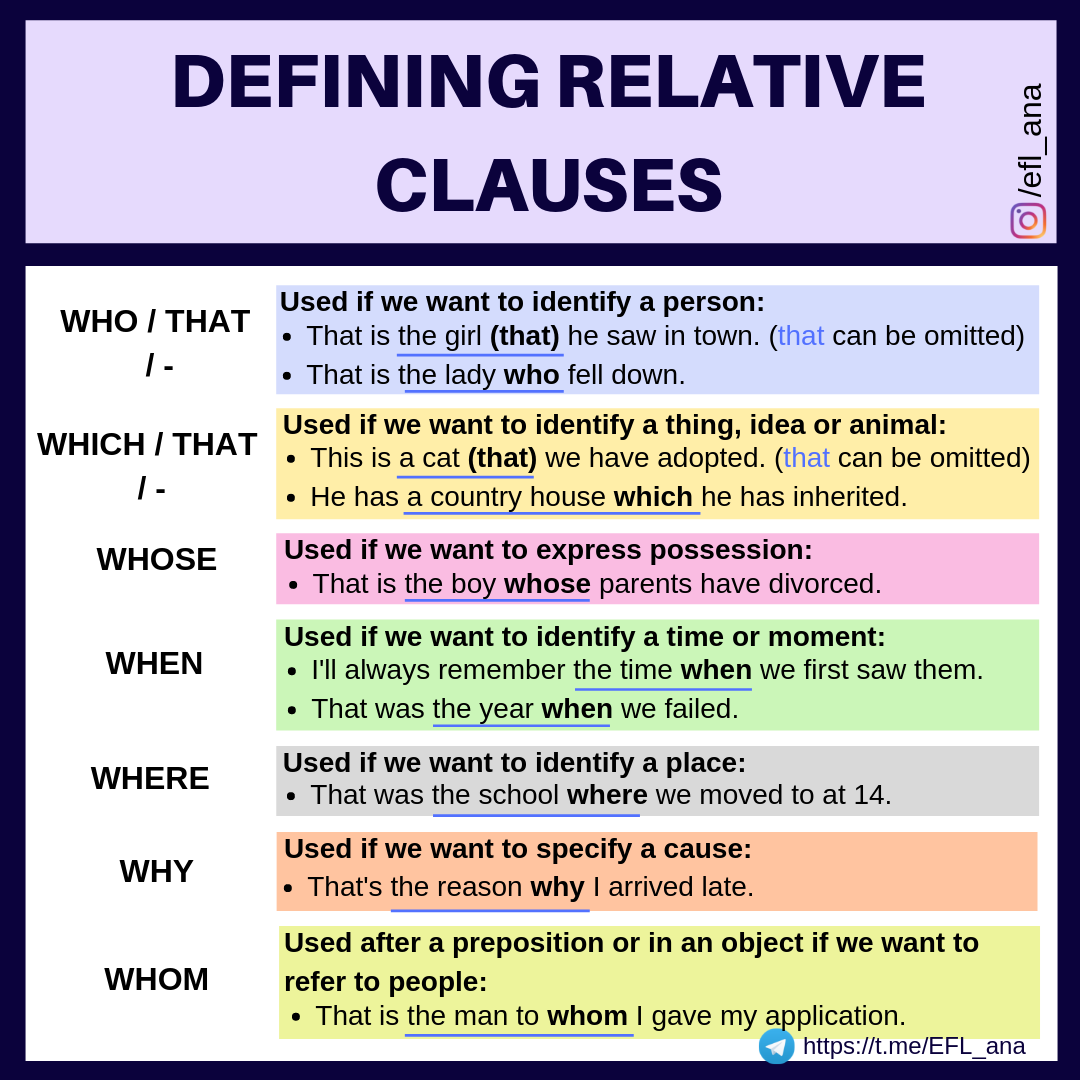
Defining And Non Defining Relative Clauses
English relative clauses list. English relative clauses für Klasse 5, Klasse 6, Klasse 7, Klasse 8 und Klasse 9. Who, whose und which mit Übungen, Regeln, Beispielen und Lösungen. Regeln zu who whose which, relative clauses - Englisch Grammatik mit Erklärungen, Test und Lösungen.

Pin on Relative clauses
Relative Clauses - Free Exercise display incorrect answers Exercises Select the correct relative pronoun. The children are collecting the leaves have fallen from the trees. The boy watch had stopped didn't know that he was late. Linda, is out in the open all day, never catches a cold. You should not drive a car brakes don't work! The man

relative clause Google Search Relative clauses, English grammar, Learn english words
Übung zu den Relativsätzen Relativpronomen (who / which / whose) Entscheide, ob du who, which oder whose einsetzen musst. This is the bank was robbed yesterday. A boy sister is in my class was in the bank at that time. The man robbed the bank had two pistols. He wore a mask made him look like Mickey Mouse. He came with a friend

Relative Clauses worksheet Free ESL printable worksheets made by teachers Relative clauses
Übungen und Tests zu Relativsätzen Einen Relativsatz verwendet man, um eine Sache näher zu beschreiben ohne einen neuen Satz zu beginnen. Wenn man die Informationen miteinander verbindet, klingt die Aussage nicht so abgehackt und man muss bestimmte Wörter nicht wiederholen. Bildung von Relativsätzen

RELATIVE CLAUSESArbeitsblatt Kostenlose ESLArbeitsblätter, die von Lehrern erstellt wurden
Introduction. Relative clauses allow us to provide additional information without having to start a new sentence. In English, there are two types of relative clauses: defining relative clauses, used without commas, and non-defining clauses which are set off by commas. Learn about defining and non-defining relative clause with Lingolia's grammar lesson.

Einzigartig Relative Clauses übungen
Students > Solutions > Intermediate > Grammar > Unit 3 - Exercise 1 - Defining relative clauses. Speaking English; Grammar Unit 3 - Exercise 1 - Defining relative clauses.

Relative Clauses With Prepositional Verbs Worksheet
Relative Clauses 1 Add the phrase in brackets to the sentence using 'that' or 'who' and a relative clause: See more relative clauses exercises here. Do you want to master English grammar? Click here to read about the membership. English grammar exercise about relative clauses

Nondefining relative clauses Relative clauses, Clause, Relative pronouns
A fridge is a thing (keep food cool) A DJ is someone (play music in a disco) A bee is an insect (make honey) A lemon is a fruit (be yellow and sour) A watch is a thing (tell the time) A ferry is a ship (carry people across the water) A shop assistant is someone (work in a shop) A key is a thing (can open and lock doors)

German Relative Clauses Learn German with
Exercise 1 Choose the correct relative pronoun or adverb for the following defining and non-defining relative clauses. Page 1 of 2 1 This is the place ______ I saw him the last time. a. where b. which c. that 2 That's the man ______ daughter has won the lottery. a. which b. who c. whose 3 Do you know the musician ______ is playing the guitar.

Ana's ESL blog Defining relative clauses
EXERCISE 1 Fill in who or which. (Put the relative pronoun in brackets if you can leave it out.) Setze who oder which ein. Setze das Relativpronomen in Klammern, wenn du es auslassen kannst. Nick is a boy __________ is in my class. I have a new computer game __________ I can show you. This is the book __________ we read in class.

Relative clauses interactive and downloadable worksheet. You can do the exercises onlin
Relative clauses 1 Exercises - relative pronouns Who, which, where - exercises Who, which, where: quiz 1 Test 1: who, which, where. Write: who, which or where. That, who, which, where - exercises Who, whose, which - test 1 Who, whose, which - test 2 That, who, whose, which, where: quiz 2 Test 2: that, who, whose, which, where

Nondefining relative clauses Relative clauses, Relative pronouns, English grammar worksheets
Grammar test 1 Read the explanation to learn more. Grammar explanation Relative clauses give us information about the person or thing mentioned. Non-defining relative clauses give us extra information about someone or something. It isn't essential for understanding who or what we are talking about. My grandfather, who's 87, goes swimming every day.

Einzigartig Relative Clauses übungen
Arbeitsblätter mit Übungen und Aufgaben zum Thema Relative Clauses (Relativsätze) im Englisch-Unterricht in der 6. Klasse am Gymnasium (2. Lernjahr) - mit Lösungen! Hier finden Sie fünf verschiedene Arbeitsblätter zum Thema Relativ Clauses (=Relativsätze). Relativsätze werden verwendet, um Sätze zu verbinden.

RELATIVE CLAUSES worksheet Free ESL printable worksheets made by teachers Relative clauses
Exercise 1 Choose the correct option to complete the sentences below. 1 Did you really understand I told you? 2 Mr. Dean, had recently been fired, had a long list of misconducts. 3 The victims, most of were adults, are being identified by the US authorities. 4 I like the scene Dorothy meets Scarecrow. 5 This is the man I am in love with.

Ficha De Relative Clause Gambaran
Exercises and Tests Exercises and tests on relative clauses We use relative clauses to give additional information about something without starting another sentence. By combining sentences with a relative clause, your text becomes more fluent and you can avoid repeating certain words. How to Form Relative Clauses Imagine, a girl is talking to Tom.

Relative Clauses Reglas de clase, Ejercicios de ingles, Verbos ingles
1. Defining clauses (Restrictive clauses) A defining (restrictive) clause is one that is essential to the sense of the sentence. My house that has a blue door needs painting. Here the blue door is a defining characteristic, it helps to distinguish that house from my other houses. Defining clauses or phrases are not separated off with commas.